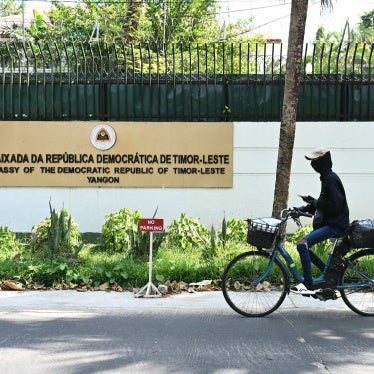China plans to welcome dozens of international leaders on September 3 to commemorate the 70th anniversary of the end of World War II. Among them is expected to be President Omar al-Bashir of Sudan, who should be in The Hague facing justice, not an honored guest anywhere.
China has made headlines recently for President Xi Jinping’s initiative to compel the return of Chinese nationals abroad who are facing charges of corruption. Yet hosting a war crimes suspect doesn’t seem to be problem.
Following years of killings, rape, and other grave international crimes by Sudanese security forces in the western region of Darfur, the International Criminal Court issued two arrest warrants for al-Bashir, in 2009 on charges of war crimes and crimes against humanity, and in 2010 on charges of genocide.
The warrants were the direct result of a United Nations Security Council resolution in 2005. China, a permanent member of the council, abstained on the resolution to send Darfur to the International Criminal Court, but didn’t veto the decision.
The Security Council resolution urges all countries to cooperate with the court’s investigation – by hosting a fugitive from the court, China is acting at odds with the resolution, snubbing international justice, and undermining its credibility as a council member. UN officials and human rights groups harshly criticized a visit by al-Bashir to China in 2011.
As an international fugitive, al-Bashir’s world has shrunk considerably over the past six years. A number of trips have been cancelled, rescheduled, or relocated amid diplomatic and public outcry. Activists have gone to domestic court to compel his arrest and protested in the streets against his presence in their countries, while local judges have issued orders for him to be taken into custody.
Experience has shown that fugitives may be able to evade justice for a time, but not indefinitely. One need only recall former Liberian President Charles Taylor’s safe haven in Nigeria after his indictment by the UN-backed Special Court for Sierra Leone. He was ultimately arrested, tried, and convicted and is serving a sentence of 50 years in the United Kingdom.
One of the lessons of World War II is that leaders can go to prison for their wartime atrocities. If China is going to disregard the warrants by inviting Bashir to its commemoration, perhaps he will at least be reminded of this.









